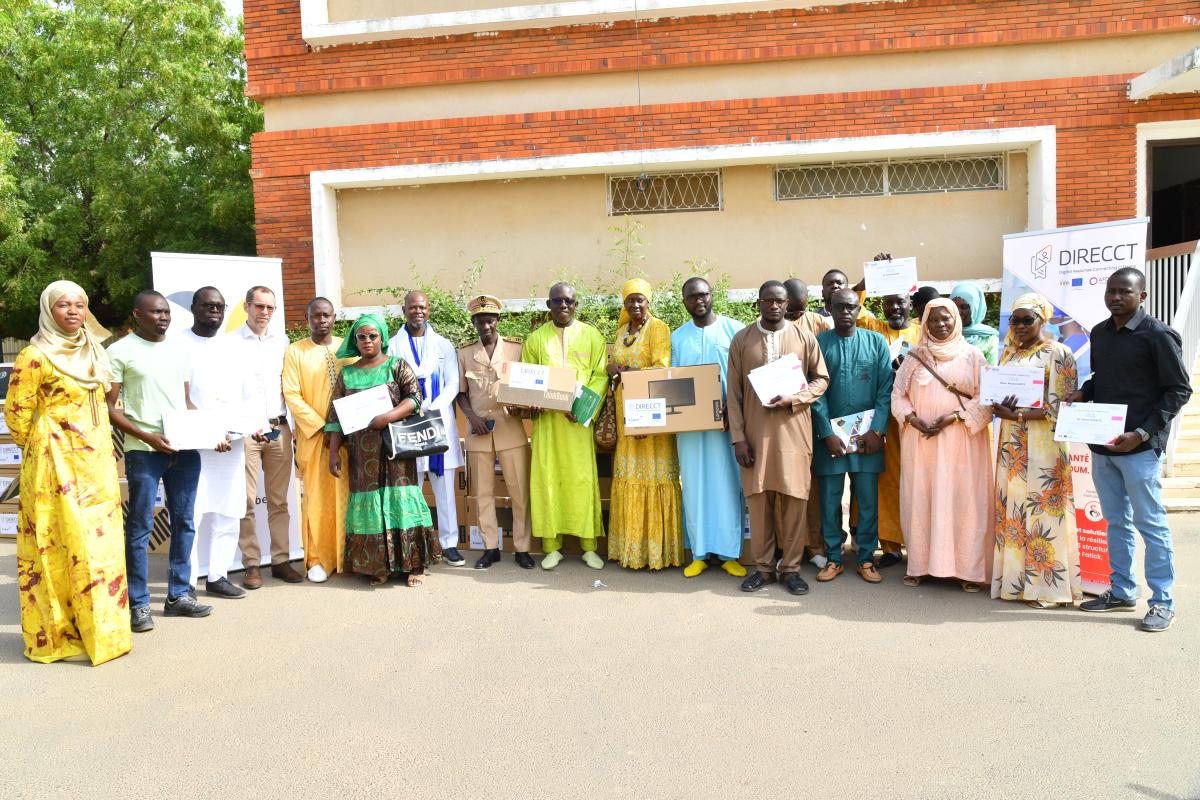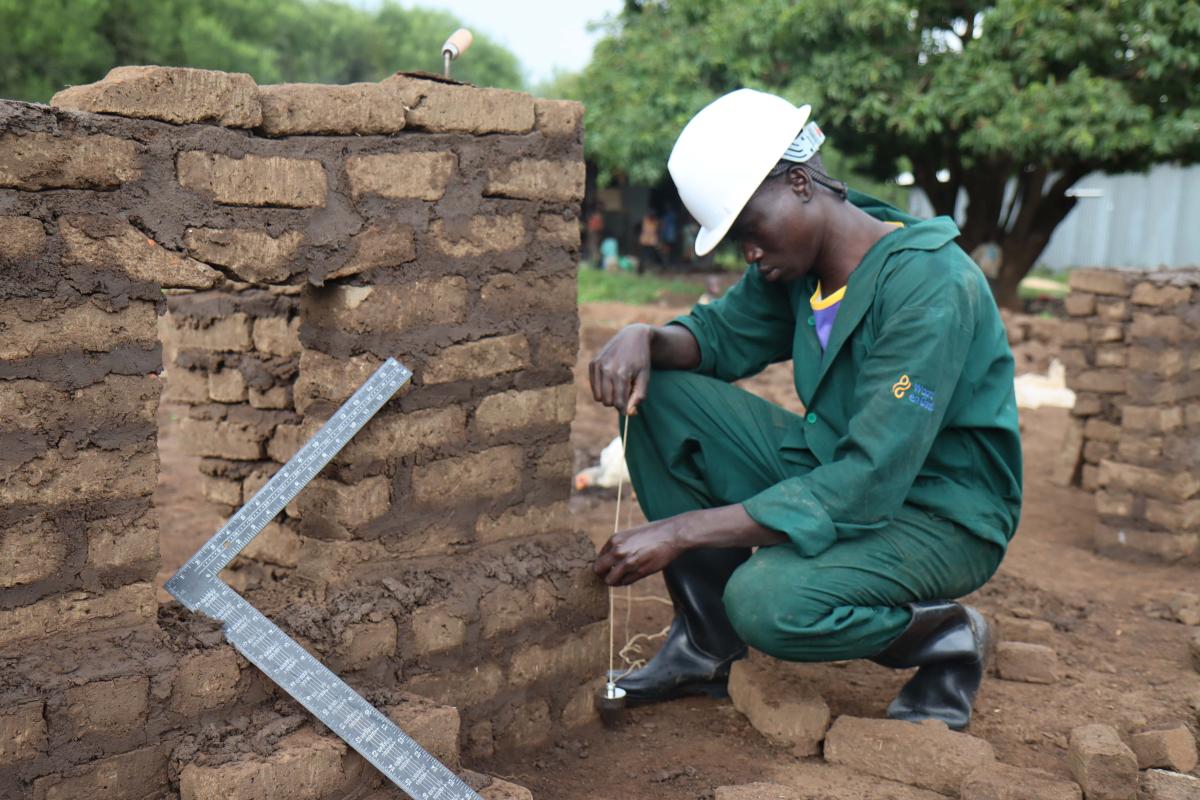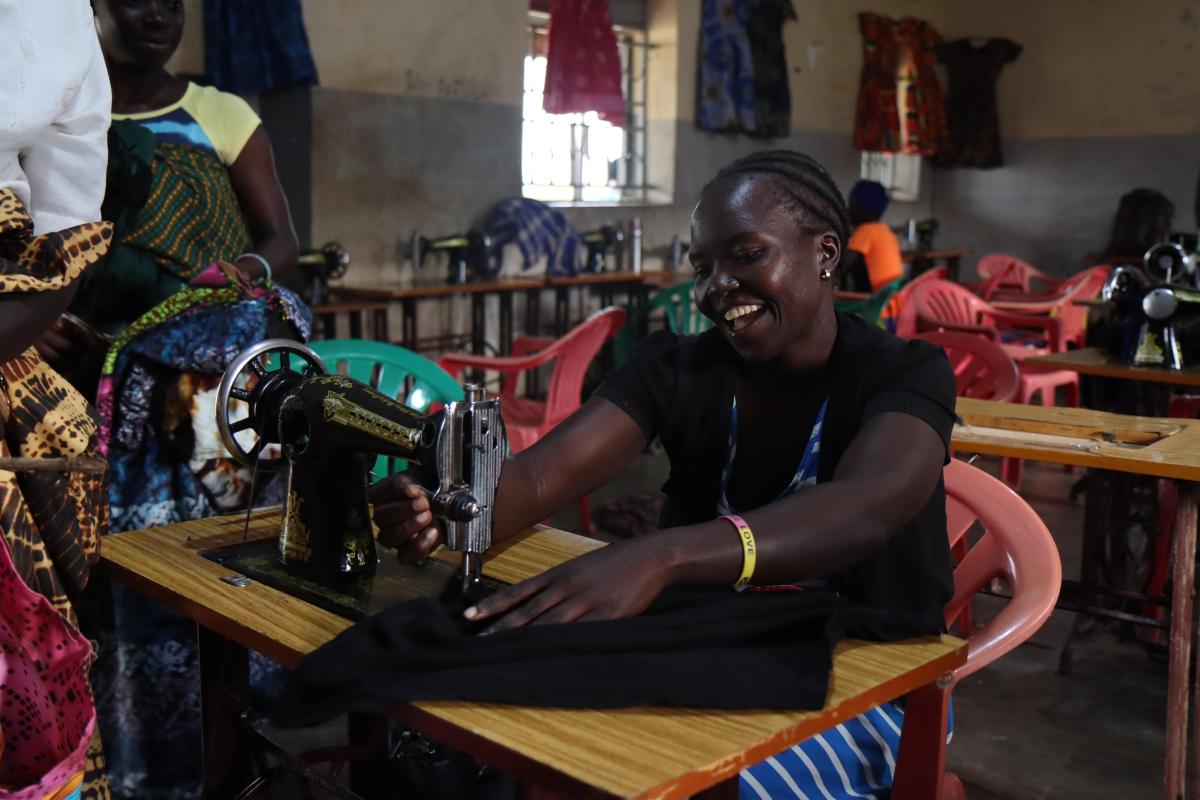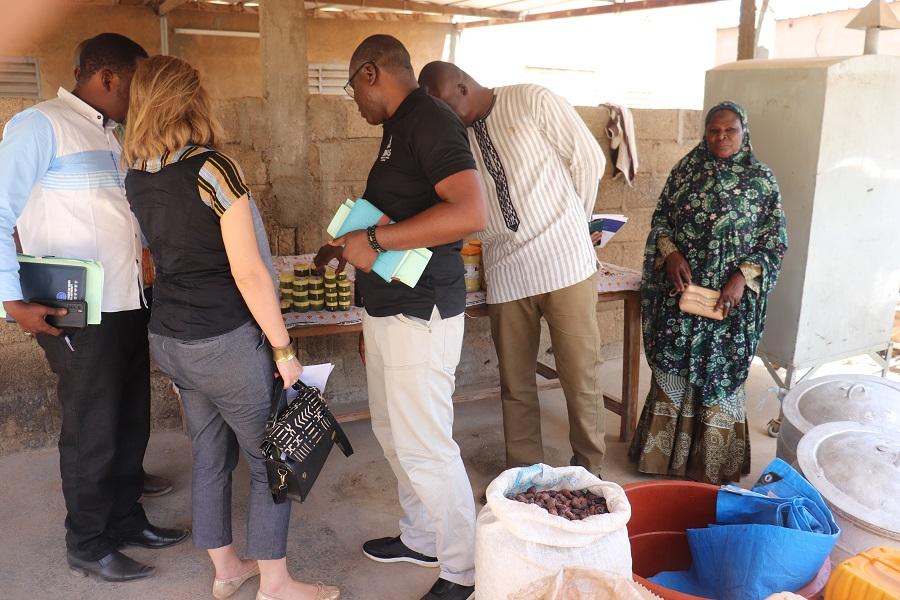Rechercher
Affichage de 675 à 690 sur 2520 actualités
-

Uganda: Digitizing Education Management
Dorothy KYAMAZIMA | 22/02/2023
For many years, the National Teachers Colleges (NTCs) have faced challenges with record keeping and managing college activities. College data was often lacking or inaccessible. Today, Colleges are using an in-house Academic Management software that is improving their digital capacity to manage college services.Click here for more: ➡️https://bit.ly/3kNS8Vl
-

Uganda: NTC Kabale's Digital Hub Takes Shape
Dorothy KYAMAZIMA | 22/02/2023
It has been quite the journey for NTC Kabale to actualize the first digital hub in the National Teachers’ Colleges. Since the benchmarking exercise in July last year, the team of digital ninjas has finally established an ideal centre that will promote innovation in teaching and learning and provide spaces for collaboration and creativity. Watch the video to find out more about the Digital Hub. Click here for more: https://bit.ly/3JxiqFN
-
Au Sénégal, Enabel appuie la digitalisation des structures sanitaires via le projet DIRECCT
Papa Djibril DIEYE | 21/02/2023
Au Sénégal, la mise en œuvre du volet santé du projet DIRECCT exécuté par Enabel et financé par l'Union européenne, vise à appuyer le Ministère de la Santé et de l’Action Sociale (MSAS) dans l’amélioration du système de collecte et de partage des informations sanitaires entre le niveau central et le niveau régional. DIRECCT contribue ainsi à la réalisation de l’objectif 74 de la stratégie Sénégal numérique 2025 : ” Mettre en œuvre la transformation numérique du secteur de la santé “, et au plan stratégique de santé numérique 2018-2023 du MSAS. Pour une meilleure identification des besoins réels des structures sanitaires cibles en matière de connectivité, le projet DIRECCT avec la facilitation du cabinet Deloitte, a initié une étude d’état des lieux exhaustive des infrastructures informatique et énergétique, de la connectivité réseau et Internet, ainsi que l’évaluation des processus et de l’organisation des 15 structures de santé dans les régions ciblées. Suite à cette étude, un plan de remédiation a été élaboré pour une meilleure prise en charge des axes d’améliorations prioritaires notamment sur le plan énergétique, connectivité réseaux et télécoms, gouvernance et gestion du système d’information et renforcement des compétences digitales du personnel de santé.Conformément aux recommandations de l’étude et en parfaite concertation avec les différents départements du Ministère de la santé et de l’action sociale (MSAS), le projet DIRECCT a acquis 167 ordinateurs de bureau, 40 ordinateurs portables, 167 onduleurs, 28 imprimantes et 11 disques durs externes. Ces équipements sont estimés à plus de 128 millions de francs CFA et vont équiper 15 centres de santé dans les régions de Fatick, Kaffrine et Kaolack. Concrètement, ce matériel permettra d’améliorer la collecte et la transmission des données sanitaires au niveau central ainsi que la qualité de prise en charge des patients. Afin d’assurer la pérennité de cet important investissement en matériel informatique et de favoriser son utilisation optimale, l’équipe du projet a organisé deux sessions de formation, du 19 au 23 décembre 2022, à l’intention de 33 agents composés d’informaticiens du MSAS et d’équipes techniques des différents sites en charge de la maintenance des équipements informatiques et réseaux.Par ailleurs, toujours dans cette démarche de renforcement des compétences numériques et afin de préparer le personnel des établissements de santé à tirer profit de la digitalisation, 17 sessions de formation sur l’utilisation des outils numériques, les concepts de base de la e-santé et les notions élémentaires de cybersécurité ont été dispensées à plus de 470 soignants. Le vendredi 17 février 2023, à la gouvernance de Kaolack, M. Ousmane Kane, gouverneur de la région de Kaolack et M. Simon Vanden Broeke, Chef d’équipe Connectivité et Investissement Durable à la délégation de l’Union européenne (UE) au Sénégal ont co-présidé la remise de ce lot d’équipements et de matériels informatiques pour permettre d’accompagner les centres de santé de la zone centre dans l’amélioration de la collecte des données de santé et de la qualité de la prise en charge des patients.Par ailleurs, des attestations de formation ont été remises aux bénéficiaires de la formation sur les fondamentaux du support informatique ainsi que sur l’administration et la maintenance des solutions réseaux.En terme de perspective, le projet DIRECCT va entreprendre avec ses partenaires la poursuite et la finalisation des travaux de câblage réseau et télécoms d’un coût global estimé à 207 millions de FCFA pour améliorer la connectivité des différentes structures de santé, l’installation des dispositifs énergétiques pour garantir la continuité des services, et enfin le déploiement d’un système d’information hospitalier couvrant tout le parcours de soins du patient dans les structures sanitaires ciblées dans les régions de Kaolack, Fatick et Kaffrine.
-

Découvrez en vidéo comment la police communautaire du Bénin travaile sur la résoultion des problèmes
Christophe ASPEEL | 21/02/2023
Grâce au principe de Résolution des problèmes, la Police communautaire dans un partenariat gagnant-gagnant avec les communautés s’active pour : • Identifier les causes potentielles de la criminalité et des conflits ; • Se pencher surtout sur les problèmes récurrents et tenaces ; • S’orienter vers les causes plutôt que vers les conséquences ; • Développer une approche intégrale et intégrée. Dans cette vidéo, Florian Amoussou et Apovo Innocientia, Commissaires principaux de Police nous en disent davantage sur ce principe.
-

Découvrez en vidéo le concept de police communautaire au Bénin
Christophe ASPEEL | 21/02/2023
PRIORP comme partenariat
-
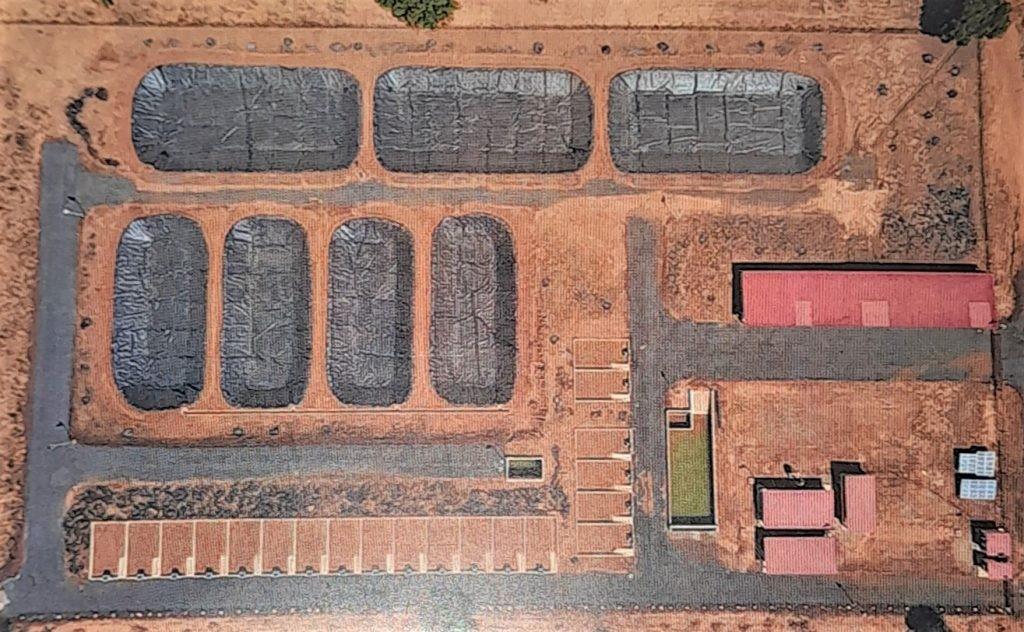
Mali : La commune urbaine de Koulikoro se dote d'une station de traitement des boues de vidange
Nènè TRAORE | 21/02/2023
Le jeudi 16 février 2023 a eu lieu à Koulikoro l'inauguration de la station de traitement des boues de vidange (STBV) de la ville. C'était sous la présidence du ministre de l'Environnement de l'assainissement et du développement durable. L'infrastructure permettra d'améliorer les conditions d'assainissement de la ville de Koulikoro à travers la récupération et le traitement des déchets liquides. La station a été réalisée par le projet d'amélioration de l'accès à l'Eau Potable et à l'Assainissement de la région de Koulikoro (PEPAK) à hauteur de plus de 1 milliard de CFA. Les travaux de la réalisation de la STBV ont démarré en octobre 2021. Deux ans plus tard,La cérémonie d'inauguration était placée sous la présidence du ministre de l'Environnement de l'assainissement et assainissement du développement durable du Mali , M. Modibo KONE avec la présence de l'ambassadeur du royaume de Belgique au Mali, son excellence Jurgen Van Meirvenne, le Conseiller aux Affaires Administratives et Juridiques du Gouverneur de la Région de Koulikoro, M . Mohamar Assagaïdou HAÏDARA , en remplacement du gouverneur de la région, du préfet du Cercle de Koulikoro, Mme Mariam COULIBALY et plusieurs autres responsables régionaux et locaux. L'activité inaugurale a été essentiellement marquée par des interventions notamment celle du maire de la commune urbaine de Koulikoro M. Bakoroba KANE qui a souhaité la bienvenue aux invités. D'autres faits marquants de cette inauguration ont été l'intervention du ministre de la tutelle qui a fait ressortir tous les avantages que l'infrastructure pourra offrir à la ville de Koulikoro et la capitale malienne.Des avantages qui s'inscrivent dans le cadre de l'assainissement et du bien-être de la population. L'accueil du premier camion de déchet liquide, la coupure du ruban symbolique et la visite des installations ont été aussi des temps forts de cette matinée . Capacité d'accueil de la STBV L'infrastructure qui est bâtie sur une superficie de trois hectares (sur 10 attribués par la Mairie) a coûté la somme de 1,3 milliard de francs CFA. Elle est conçue pour recevoir environ 10 camions par jour avec une capacité de traitement de 56 m³ par jour (dont 16 m³ d'excrétas et 40 m³ de boues).En plus de sa contribution à l'amélioration du cadre de vie des populations, la station permettra aussi de créer directement une dizaine d'emplois et beaucoup d'autres de façon indirecte. Cette installation de taille est une première réalisation au Mali en termes d'assainissement. Une réalisation qui répond à l'aspiration de la population compte tenu de son ambition qui est celle de vivre dans un environnement sain. Cependant, après la réception du premier camion transportant des déchets liquides, la continuité et la gestion se sont révélées comme des problèmes. Cela du fait que les habitants de la ville n'ont pas l'habitude de telle réalisation.La réception du premier camion, marque la mise à disposition de l'infrastructure aux autorités communales, ainsi la gestion leur revient. Celles-ci doivent s'atteler à développer des stratégies cohérentes afin de maintenir la fonctionnalité de la STBV. Mais il importe de noter que la mairie de la commune urbaine de Koulikoro a déjà signé un protocole d'accord avec l' Agence Nationale de Gestion des Stations d'Epuration du Mali (ANGESEM) pour la délégation de la gestion de la station. Mais toujours est-il que l'implication de la population et les autres structures concernées doivent être de mise pour la mairie de Koulikoro et ses partenaires. habitude de telle réalisation. La réception du premier camion, marque la mise à disposition de l'infrastructure aux autorités communales, ainsi la gestion leur revient. Celles-ci doivent s'atteller à développer des stratégies cohérentes afin de maintenir la fonctionnalité de la STBV.Mais il importe de noter que la mairie de la commune urbaine de Koulikoro a déjà signé un protocole d'accord avec l'ANGESEM pour la délégation de la gestion de la gare. Mais toujours est-il que l'implication de la population et les autres structures concernées doivent être de mise pour la mairie de Koulikoro et ses partenaires. habitude de telle réalisation. La réception du premier camion, marque la mise à disposition de l'infrastructure aux autorités communales, ainsi la gestion leur revient.Celles-ci doivent s'atteller à développer des stratégies cohérentes afin de maintenir la fonctionnalité de la STBV. Mais il importe de noter que la mairie de la commune urbaine de Koulikoro a déjà signé un protocole d'accord avec l'ANGESEM pour la délégation de la gestion de la gare. Mais toujours est-il que l'implication de la population et les autres structures concernées doivent être de mise pour la mairie de Koulikoro et ses partenaires. Atteler à développer des stratégies cohérentes afin de maintenir la fonctionnalité de la STBV.Mais il importe de noter que la mairie de la commune urbaine de Koulikoro a déjà signé un protocole d'accord avec l'ANGESEM pour la délégation de la gestion de la gare .Mais toujours est-il que l'implication de la population et les autres structures concernées doivent être de mise pour la mairie de Koulikoro et ses partenaires.Comment cette station sera-t-elle alimentée ? Une brigade d'assainissement est déjà mis en place par la commune urbaine avec l'appui du projet PEPAK. Cette structure aura pour tâche en partie de veiller à l'assainissement dans la ville, mais également pour mieux orienter la population vers une appropriation judicieuse de la STBV. Par ailleurs, la brigade permettra de renforcer le processus de sensibilisation et d'information de la population de Koulikoro sur les objectifs de la réalisation de l'infrastructure. Cela dans la perspective de mieux impliquer cette population dans la gestion de la station . Mais en amont, des latrines modernes seront multipliées dans la commune afin de ravitailler convenablement la station.
-
Uganda: Onen quit a Sh.200,000 job to acquire vocational skills and becoming self-employed"
Catherine BEKUNDA | 20/02/2023
It is said that better the devil you know than the angel you do not know.But Godwill Onen took the risk of meeting the unknown angel in the hopes that it would be an angel of good fortune and prosperity. He has not been let down.Onen is 26 years old and stopped in senior two in 2016.He is from Lotuke Sub County and studies Building Construction Practice at Achangali Technical Institute in Abim.Onen quit his job as a casual labourer in a bakery in Lira, where he was earning Sh.56,000 per week, because it could not support his lifestyle, which included paying rent of Sh.70,000 per month as well as personal expenses."I lived under the constant fear that I would be chased anytime, there was no job security. I chose this course because it will allow me to be self-employed and have a job for the rest of my life," he explains.He is married but has no children yet which has given him ample time to prepare and study.Onen advises the youth to appreciate what they have and not give up hope."Youth should not waste their opportunities; God's blessings come slowly but steadily," he advises.His mother gave him the best advice he has ever received, telling him that there are no permanent conditions in life."You may experience hardship today but this can change tomorrow. This has taught me to bear anything," Onen says.Onen is one of several young people benefiting from Enabel's Skilling Uganda program in Karamoja region, which is funded by the Irish Embassy.
-
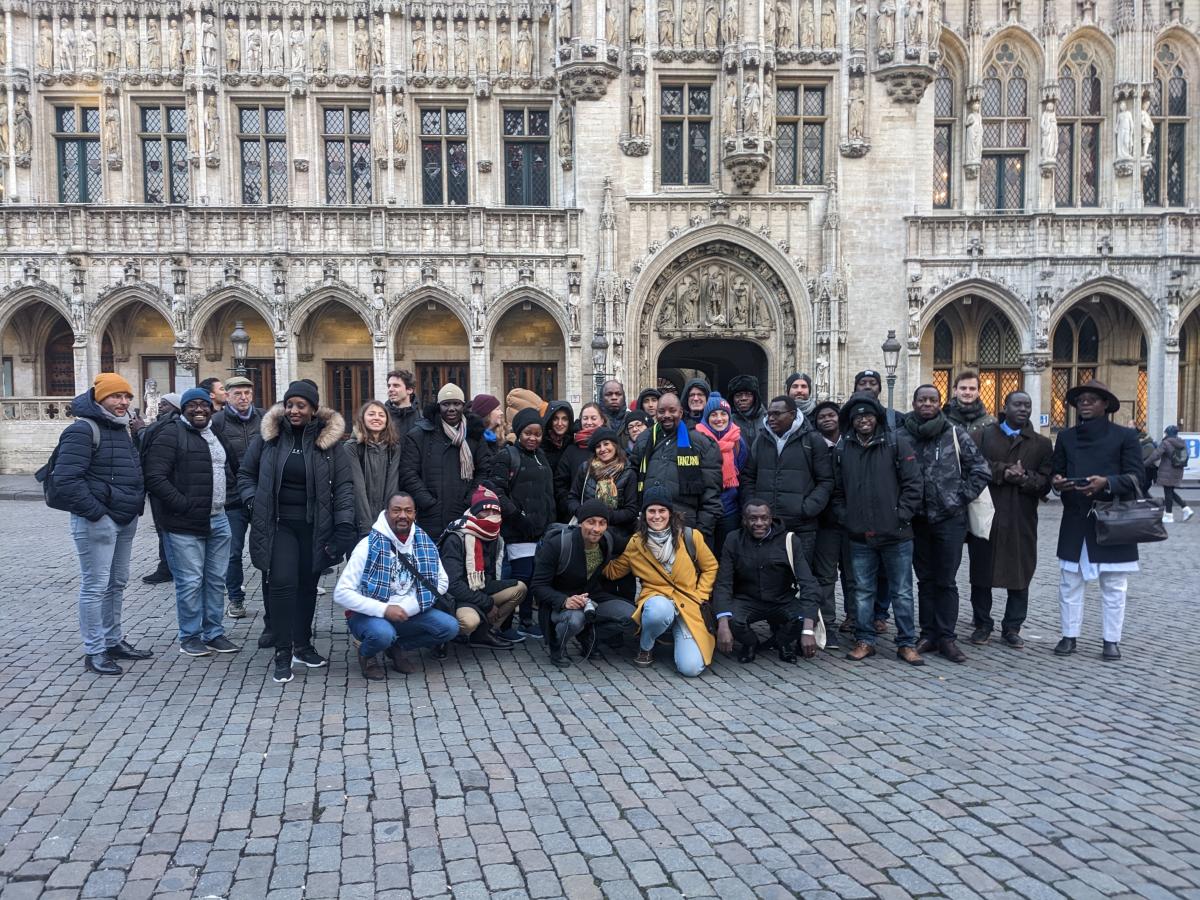
Wehubit Week: Takeaways for 2023?
Lucie BRICOUT | 20/02/2023
The Wehubit team organised the Wehubit Week in December. Almost 50 people from 12 partner countries attended the Brussels event to represent the 27 digital social innovation projects. Meanwhile, 2023 is well underway. What are the Wehubit Week takeaways that provide guidance to the programme and its partners in the new year? 1. From networking to new partnerships In addition to financial and technical support, Wehubit has developed a sizeable learning component. Indeed, the programme has its own Knowledge Exchange Network (KEN). The Wehubit Week marked the first ever face-to-face meeting with most network members attending. This has borne fruit: a new working group on innovation will soon be launched. Some of the network meetings led to further meetings being scheduled in partner countries. 2. Building bridges between Enabel's expertise and that of Wehubit's partner projects Between sessions on Principles for Digital Development, Gender and Digitisation and Scaling up Social Innovation, the Wehubit Week was a real learning event. Several Enabel experts joined forces with the Wehubit team to make this week a success. In addition to capacity building, the collaborative workshops show that there are links made or to be made between Enabel and Wehubit projects. The participants, who share similar values and goals, could learn from each other. Strengthening these links is a priority for Wehubit and will be even more so for the second Wehubit programme 3. Consolidating the Wehubit Knowledge Exchange Network (KEN) In just one and a half year, the KEN has become a dynamic and proactive network. This network has three objectives: capacity building (webinars, theoretical and practical training), partnership building and knowledge building. The Wehubit Week has significantly contributed to each of these three. But more importantly, it has opened up the network to new perspectives. The 50 partner organisations in the network have now taken ownership of the KEN. What binds these partners? The answer is multi-faceted: Digital for Development (D4D), social innovation and scaling up, the Human Rights-based Approach, etc. But the most fundamental common interest, the keystone of KEN, is learning. "Showing successes as well as failures leads to learning, opening up the field of possibilities," explains one of Wehubit's KEN members. Wehubit Week was at the heart of learning and vice versa. Do you want to learn more? Learn from the best practices and lessons learned from Wehubit's partner projects by browsing the e-library. https://www.wehubit.be/en/e-library
-
Uganda: When a training course is a second chance at life
Catherine BEKUNDA | 20/02/2023
Lance Armstrong once said, "If you ever get a second chance in life for something, you have to go all the way."The words ring true for Sarah Angom, who sees the opportunity to study fashion design as a second chance.Angom became pregnant during her senior four vacation, and as fate would have it, she gave birth to a child with sickle cell disease, an issue that has plagued her to this day."Life was difficult because my parents refused to take me back to school."I prayed to God for a second chance, and I am grateful that this opportunity came and I was chosen," Ongom says."I'm learning skills, and I'm confident I'll improve my life," says Ongom, who now aspires to be an example to her peers."I want to tell them that it is not only office jobs that can provide them with an income; even manual labor can feed you and enable you to care for your family," she explains.Angom left the child with her mother before enrolling for the course after her husband's family blamed her for bringing sickle cell disease into their home."If I can be given a sewing machine, I will immediately start my business because I live in town," she hopes."I have experience, I appeal to my fellow sisters to be patient and commit themselves to God who has the ability to give us second chances even when we have been disobedient to him."They should concentrate on their studies and pay attention to their teachers," she advises.Angom is an orphan with nine siblings who lost their father in 2007.She is currently enrolled in Achangali Technical Institute in Abim District.She is one of 31 girls and women being trained in fashion design at the institute, which is sponsored by Enabel and funded by the Embassy of Ireland.
-
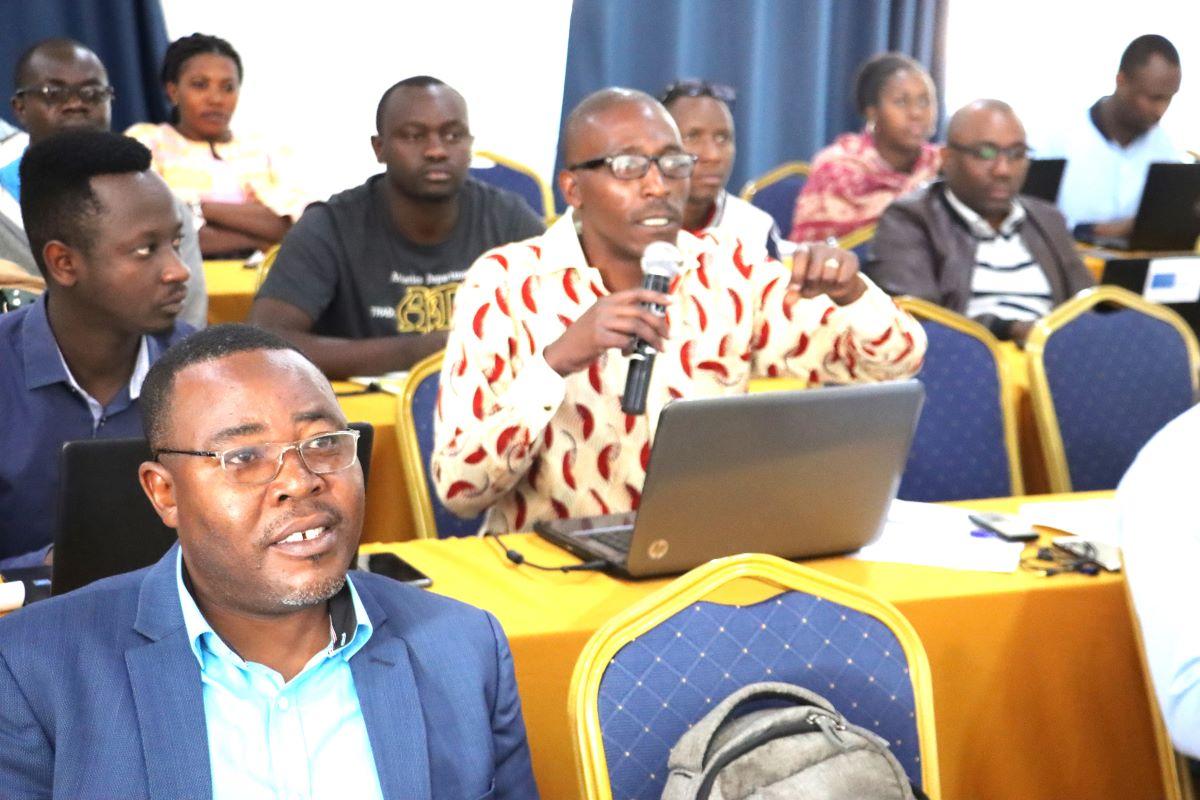
Burundi : La digitalisation du système d’information hospitalier améliore la qualité des soins et des services de santé
Jean BIRONKWA | 16/02/2023
En partenariat avec Enabel à travers le Projet d’Appui au Système National d’Information Sanitaire (PAISS4), le Ministère de la Santé publique et de la Lutte contre le Sida a initié le processus de digitalisation du secteur de la santé depuis 2013. A l’horizon 2024, 36 hôpitaux publics et confessionnels seront informatisés avec l’appui technique et financier d’Enabel et de l’Union Européenne. Le projet d’appui au Système national de l’Information sanitaire (PAISS4) vise le renforcement du Système national d’Information sanitaire pour lui permettre d’avoir en temps opportun des informations sanitaires pertinentes, fiables et de façon pérenne pour orienter la prise de décision. Les applications informatiques utilisées au Burundi actuellement dans la gestion du système d’information hospitalier (SIH) sont principalement OpenClinic et Quick Soft. C’est dans ce contexte que le Ministère de la Santé publique et de la Lutte contre le Sida en partenariat avec Enabel a organisé un atelier de restitution des résultats de l’évaluation de la digitalisation du SIH du 09 au 10 février 2023 à Gitega. Cette évaluation a été réalisée de septembre à décembre 2022 dans 31 hôpitaux informatisés. Elle avait pour but de faire un état des lieux sur le fonctionnement et l’utilisation des différentes applications informatiques mises en place ainsi que la perception des différents utilisateurs au niveau des hôpitaux. L’atelier de restitution a réuni une cinquantaine des participants issus du cabinet du Ministère de la Santé publique, du Programme en charge de l’informatisation, des directeurs des hôpitaux évalués ainsi que les représentants des partenaires qui appuient l’informatisation du secteur de la santé au Burundi. Les présentations faites par les cadres du Programme d’informatisation du secteur de la santé (PROGISSA) au MSPLS ont montré que l’évaluation a été faite sous 3 dimensions (opérationnelle, technologique et fonctionnelle). Les résultats sont globalement satisfaisants et des recommandations ont été formulées à l’endroit des différents acteurs dans la digitalisation en vue d’aller de l’avant. Le PROGISSA a signalé que les témoignages récoltés auprès des différents utilisateurs rencontrés montrent que la digitalisation du SIH a produit un impact important sur l’augmentation des recettes financières des structures de soins, le recouvrement des créances et l’amélioration de la traçabilité dans la facturation des prestations réalisées ainsi que dans le domaine de la gestion des médicaments. « Nous remercions tous les partenaires qui appuient la digitalisation du secteur de la santé car cela cadre bien avec les orientations du Ministère de la santé à travers son Plan National de Développement Sanitaire pour la période de 2019 à 2024 (PNDS III 2019-2024) visant l'amélioration de la santé de ses populations. Le chef de l’état vient également d’exiger la digitalisation de tous les services publics pour améliorer la qualité des services accordés à la population burundaise, ce qui montre encore une fois la pertinence de ce système d’informatisation des hôpitaux », ont fait savoir les cadres du Programme PROGISSA et les représentants du MSPLS. Compte tenu de l’intérêt de ce genre d’évaluation, les participants ont recommandé de la faire 2 fois par an afin de faire le suivi des recommandations émises lors de l’atelier de restitution.
-
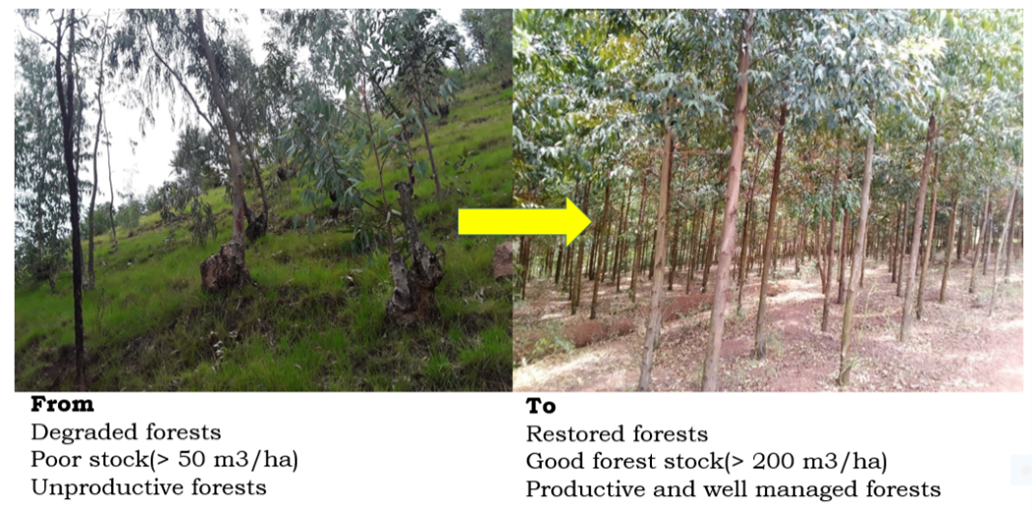
Improvment of biodiversity in degraded landscapes of Rwanda’s Eastern Province through innovative approaches
Denise NSANGA | 13/02/2023
Enabel in collaboration with Rwanda Forestry Authority (RFA), Rwanda’s Ministry of Environment and World Vision has been conducting consultation meetings with District officials and technicians from the Eastern Province of Rwanda on approaches to increase and improve biodiversity in the seven District of the Eastern Province namely Bugesera, Gatsibo, Kayonza, Kirehe, Ngoma, Nyagatare and Rwamagana. The approaches include Biodiversity Sancta and Private Forest Management Unit (PFMU). Biodiversity Sancta is an innovative approach developed under COMBIO project to promote biodiversity in degraded landscapes of Rwanda’s Eastern Province using local community. Biodiversity sancta is an area of around 15-20ha dedicated for native tree species production, planting and valorization through establishment and maintenance on different compartments such as Nursery, botanical garden, pharmacopeia and Essential oil native species garden, fruit tree orchards, Native shrubs seed stand etc, all managed by local community groups organized into cooperatives. Biodiversity sancta will be benefiting community living around it and the country in general through the supply of sufficient quality native germplasm, supporting pollination and beekeeping value chains, traditional medicine and essential oil, ecotourism etc. It will promote easy access and promotion of native fruits and will support awareness and education of communities on the use of native species. Private Forest Management Unit – PFMU, (Impuzamashyamba in local language, Kinyarwanda) is an approach developed and successfully piloted in Rwamagana, Gicumbi, Gakenke and Rulindo districts in the former Belgian funded FMBE project to support smallholder private forest owners in the conversion of their degraded old forest into productive forest and ensure their sustainable management in the years ahead following a designed SFMP for each restored PFMU. TREPA will support the restoration of 6,545 ha of private forests through PFMU approach. Both Biodiversity Sancta and PFMU approaches will be used in recently launched Green Climate Fund-GCF funded TREPA project and the Swedish International Development Agency-SIDA funded COMBIO Project to support restoration of degraded landscapes through forests and agroforestry landscapes restoration and promotion of diverse native tree species to boost biodiversity in the seven districts of Eastern Province of Rwanda. About COMBIO and linkage with TREPA project COMBIO project entitled “Reducing vulnerability to climate change through enhanced Community-based Biodiversity conservation in the Eastern Province of Rwanda” is a six-year project (2021-2027) funded by SIDA to support the restoration and improved management of eight natural forests protected by 2015 ministerial decree and increase the use of native tree species in productive areas restored by TREPA (Transforming the Eastern Province through Adaptation) Project. COMBIO project was developed to complement TREPA restoration efforts and will be supporting in promoting the use of diversified native species to restore and protect biodiversity over the targeted TREPA landscapes of the Eastern Province. COMBIO will support establishment and maintenance of 3-5 biodiversity sancta per District and the integration of native species over the 50,000 ha of agroforestry and silvopastoral landscapes at a rate of 16% of native trees/shrubs and over the 10.000 ha of public and small holder forests at a rate of 5% of native trees.
-
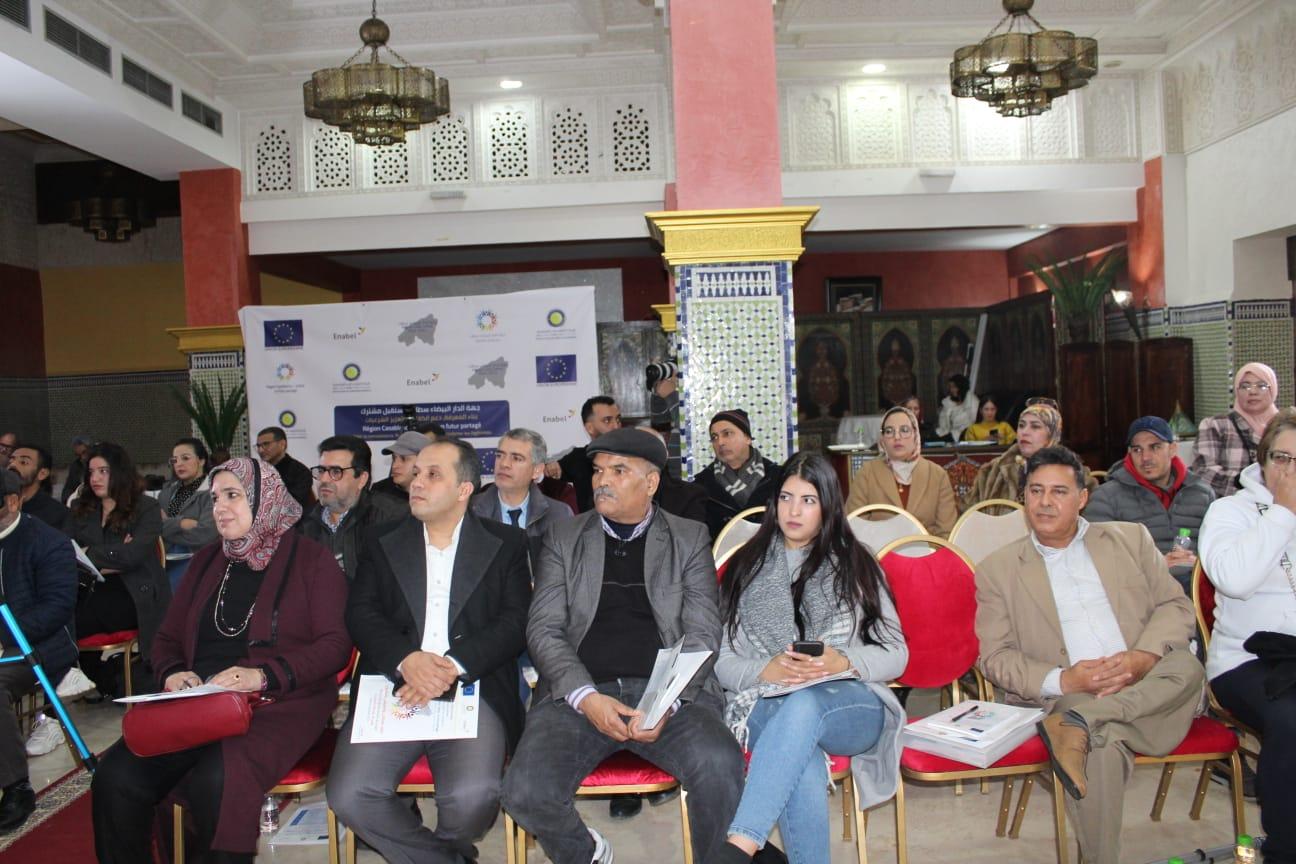
Au Maroc, lancement de 2 projets prometteurs en lien avec la participation citoyenne
Julie GEERTS | 07/02/2023
En décembre 2022, dans le cadre du projet TADAFOR, Enabel au Maroc a signé deux conventions de subsides avec les associations ELCIFODEM à Mohammedia et Madinati à Larache. Ces 2 associations ont un projet prometteur en lien avec la participation citoyenne au niveau local et recevront un appui technique et financier dans le cadre du projet TADAFOR, qui vise à soutenir les actions de la société civile pour le développement local dans le cadre de la participation citoyenne.Quels sont ces projets prometteurs ? Le réseau ELCIFODEM « Espace Libre pour la Citoyenneté, la Formation et le Développement à Mohammedia » mettra en œuvre son projet « Casa-Settat : un futur partagé ». Concrètement, ce projet travaillera sur trois axes :Inciter les citoyen·ne·s à participer au développement de leur territoire via l’organisation d’ateliers d’urbanisme participatif et le lancement d’une compétition régionale entre jeunes acteurs locaux sur la prise de parole en public et le plaidoyer pour promouvoir le leadership citoyen dans les espaces de participation citoyenne ;Consolider la gouvernance territoriale en renforçant les capacités de la société civile, des membres de l’IEECAG, et des élu·e·s et fonctionnaires communaux sur les outils et mécanismes de participation citoyenne traditionnels et innovants, la digitalisation, la prise de parole en public, etc… ; Renforcer la confiance entre la société civile et les institutions publiques et accroître la légitimité de ces dernières à travers de multiples espaces de participation citoyenne tels que les cafés citoyens, l'invité du mois et les forums citoyens. Le projet de l’association Madinati - Larache, signifiant « Ma Ville », vise à promouvoir la participation citoyenne dans la région Tanger-Tétouan- Al Hoceima. Concrètement, ce projet travaillera sur 3 axes : L’élaboration, de manière inclusive, d’une stratégie de développement de la participation citoyenne au niveau des communes d’Al Hoceima, Larache, et Tanger et la validation de cette stratégie par les conseils communaux respectifs ;Améliorer la qualité de la participation citoyenne et l’accès à l’information publique à travers la mise en œuvre de la stratégie de développement de la participation citoyenne et à travers le renforcement de capacités sur la participation citoyenne de la société civile, des instances consultatives, et des élu·e·s et fonctionnaires des communes de Larache, Tanger, et Al Hoceima ;Institutionnaliser les bonnes pratiques en matière de participation citoyenne en développant et en soutenant des initiatives citoyennes qui travaillent sur la mise en œuvre du Partenariat pour un Gouvernement Ouvert (Open Government Partnership). D’autres conventions de subsides avec des organisations de la société civile actives pour renforcer la participation citoyenne sont prévues pour l’année 2023.Pour rappel, le projet TADAFOR, mis en œuvre par Enabel en étroite collaboration avec la Direction Générale des Collectivités Territoriales et la Direction des Relations avec la Société Civile, est la composante 2 du programme d’appui à la participation citoyenne qui s’inscrit dans le cadre du partenariat entre le Royaume du Maroc et l’Union européenne. Il vise à appuyer les efforts déployés du pays en matière de promotion de la démocratie participative et de la participation citoyenne au Maroc. Pour une durée de 3 ans, il est déployé dans cinq régions du Maroc à savoir Casablanca Settat, l’Oriental, Souss Massa, Tanger-Tétouan-Al Hoceima et Béni Mellal Khénifra.
-
Au Burkina Faso, Enabel et son partenaire TRIAS facilitent l’accès aux crédits à des coopératives agricoles
Kimsegninga SAVADOGO | 02/02/2023
Une équipe de l’intervention Entrepreneuriat d’Enabel au Burkina Faso, conduite par l’Intervention Manager Julie VAN DER SMISSEN a effectué le mercredi 25 janvier 2023 avec le partenaire TRIAS, une mission conjointe à Koupéla, chef-lieu de la province du Kourittenga, dans la région du Centre-Est pour une visite de coopératives locales constituées en Sociétés de Cautionnement Mutuel (SCM) dans le cadre du projet d’appui à la mise en place de SCM au sein des filières agricoles Soja, Sésame et produits forestiers non ligneux (PFNL). La Haut-Commissaire de la province s’engage à être l’ambassadrice des SCM Avant les contacts directs avec les coopératives organisées en SCM sur le terrain, l’équipe a rendu une visite à la Haut-Commissaire du Kourittenga, Madame Aissata Angélina TRAORE. L’occasion a été belle pour la Cheffe de projet Entrepreneuriat d’Enabel, Julie VAN DER SMISSEN, de présenter à la première responsable de la province, son intervention avec un focus sur les chaînes de valeur agricoles (filières sésame et soja) et les produits forestiers non ligneux (karité, neem et balanites) dont l’action est portée en partenariat avec TRIAS.A cette rencontre, Madame la Haut-Commissaire a fait savoir que la recherche de financements au profit des coopératives, constitue une grande préoccupation pour les coopératives agricoles de la région. Pour ce faire elle a loué les efforts d’Enabel dans ce domaine et salué le dynamisme de la coopération belgo-burkinabè. A l'issue des échanges, Madame Aissata Angélina a pris l’engagement d’être l’ambassadrice des SCM au Burkina Faso et affirmé qu’elle plaidera pour le renforcement de l’accompagnement des producteurs qui ont d’énormes besoins de financement pour développer leurs activités. Deux Sociétés Coopératives/SCM appuyées par le projet visitées La visite a été effectuée auprès de deux SCM : « Zama Nooma » de Koupéla et « Wend-Songré » de Silmiougou Boumboundi. La SCM « Zama Nooma » est mise en place par trois coopératives de base œuvrant la production du beurre de karité : Teeg-Wende, Wendlamita et Neblabumbu. Elle a été créée en mars 2022 avec un effectif total de 105 femmes membres dont 52 ont accédé à des crédits grâce à ce mécanisme de cautionnement mutuel. Cette SCM est affiliée au Réseau des Caisses Populaires. Son Fonds de cautionnement est de 5,7 millions de FCFA dont 50% mobilisés par les femmes elles-mêmes et 50% de subvention du projet grâce à l’appui financier d’Enabel. Quant à la SCM « Wend-Songré », située à environ 40km de Koupéla, elle a été mise en place par les membres de la coopérative Wend-Songré de Silmiougou, . C’est une SCM mixte dont les membres exercent dans le domaine de la production du sésame. Elle a été créée en septembre 2022 avec un effectif total de 45 membres. Elle est affiliée à la Caisse des Producteurs du Burkina (CPB). Son fonds de cautionnement est de 1 million de FCFA dont 500 mille FCFA mobilisés par les membres et 500mille FCFA de subvention. Cette SCM a bénéficié d’un crédit à hauteur de 3 500 000 FCFA pour la collecte et la commercialisation du sésame. Des producteurs engagés pour promouvoir la solidarité au sein de leurs SCM Ce sont des membres de coopératives/SCM fermement engagées pour la promotion de la solidarité au sein de leurs SCM et pour le développement de leurs activités grâce aux subventions octroyées, qui ont pris part aux échanges avec l’équipe conjointe d’Enabel au Burkina Faso et de TRIAS. Partout où l’équipes est passée, le message est le même comme le fait ressortir Madame Pascaline OUBDA de « Zama Nooma » : « tous les membres de la SCM que nous sommes, avons longtemps travaillé ensemble et nous nous connaissons. Nous connaissons ceux·celles qui sont dignes de confiance. C’est pourquoi nous nous sommes engagés collectivement pour contracter et rembourser les crédits qui nous sont accordés. A l’échéance de nos premiers crédits, nous allons encore en contracter de plus conséquents et nous allons respecter les délais de remboursement. Même à la fin du projet, nous nous engageons à poursuivre nos activités pour la fructification du capital déjà constitué. Au début, nous étions réticents quand nous avons été approchés pour être organisés en SCM afin d’accéder aux crédits mais aujourd’hui, nous sommes convaincus et confiants que cette démarche est la solution aux problèmes que nous rencontrions dans la mise en œuvre de nos activités ». Une institution financière disposée à accompagner les coopératives aux côtés d’Enabel au Burkina Faso & TRIAS Pour arriver à ces résultats, le projet d’appui aux SCM noue des collaborations avec des institutions de microfinance dont, entre autres, le Réseau des Caisses Populaires du Burkina (RCPB) qui accompagne les Sociétés coopératives/SCM en crédits pour le développement de leurs activités. L’équipe conjointe a donc inscrit dans le programme du jour, une visite au siège de la Délégation des Caisses Populaires de l’Est (DCPE) à Koupéla pour échanger et recueillir les observations et les orientations de cette institution financière afin d’améliorer l’approche SCM et relever les défis en termes de financement des activités des coopératives paysannes. A ce jour, le RCPB a placé près de 77 millions de francs CFA de crédits au profit des coopératives/SCM de Tenkodogo (31 500 000 FCFA), Koupela (14 450 000 FCFA) et Pouytenga (30 669 669 FCFA) dans le cadre du projet appui aux SCM. Le Directeur régional de cette institution financière, M. Alassane M. ROUAMBA a positivement apprécié cette visite qui permet de s’enquérir des réalités du terrain et de mieux s’imprégner des engagements des coopératives contractantes de crédits. M. ROUAMBA est également revenu sur l’engagement de son institution pour le succès des SCM : « Au-delà des aspects pécuniers, notre entreprise prend en compte la caution morale et nous mettons la confiance en priorité et non pas la garantie. Nous avons la volonté d’accompagner les producteurs notamment les couches défavorisées, pour le développement de leurs activités. Même si TRIAS se retire aujourd’hui, nous n’allons pas arrêter notre collaboration avec les coopératives/SCM. Nous sommes disposés à poursuivre l’octroi des crédits aux coopératives/SCM avec lesquelles nous avons déjà entamé une relation. Nous ferons l’effort de ne pas rompre ce lien pour peu que celles-ci respectent les échéances de remboursement des crédits ». Mieux comprendre le projet « appui aux SCM » Le projet vise à faciliter l´accès au crédit à des conditions favorables aux acteurs des chaines de valeurs (CV) de soja, sésame et produits forestiers non ligneux (PNLF). Il renforce les capacités des coopératives et entreprises agricoles sur le financement agricole et la mise en place des sociétés de Cautionnement Mutuels (SCM), reconnues par les acteurs comme une alternative durable de facilitation de l’accès aux financements des coopératives villageoises (CV) agricoles. Ce mécanisme permet donc d’adresser l’épineuse question de l’incapacité des entreprises agricoles à mobiliser des garanties suffisantes permettant de lever des crédits nécessaires et adaptés. Le « fonds de cautionnement solidaire » mis en place au sein des coopératives, permet de lever ce goulot d’étranglement et d’avoir un effet de levier pour une mobilisation accrue de crédit auprès des institutions de microfinance (IMF).
-
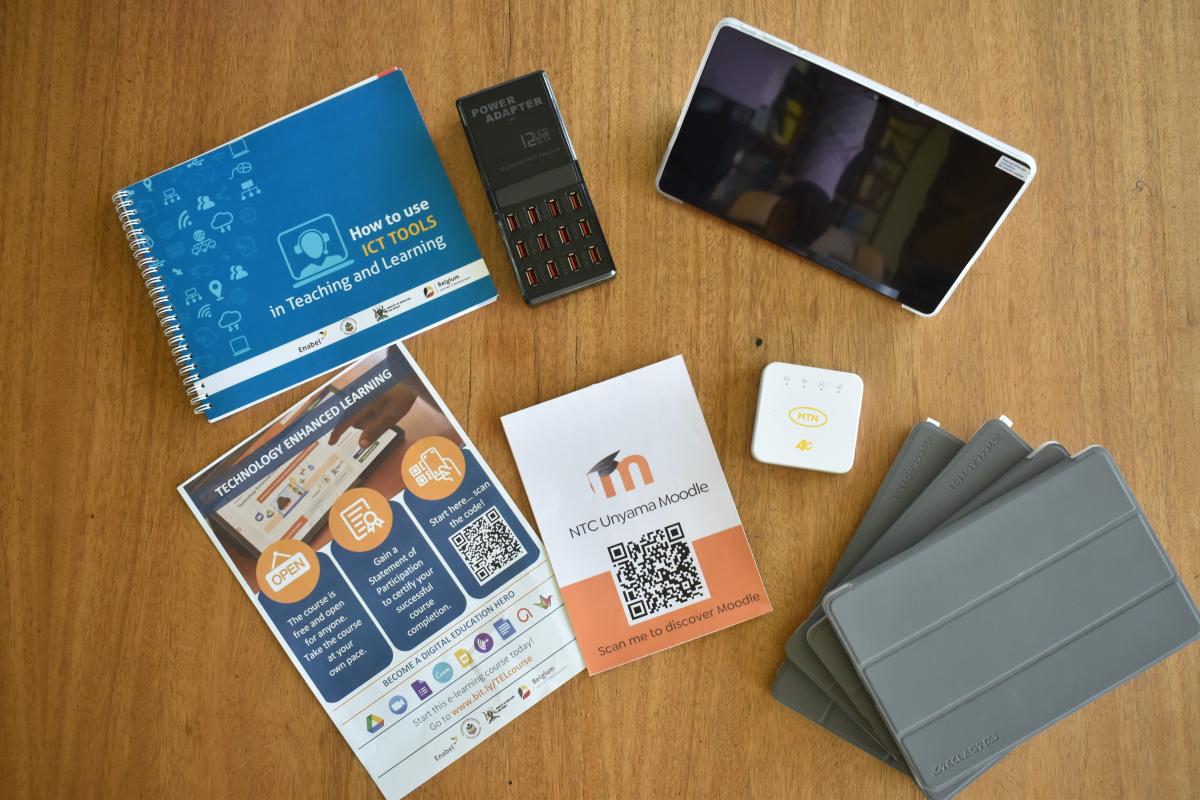
Uganda: ICT Device Scheme launched in the National Teachers’ Colleges
Peace NERIMA | 01/02/2023
To enhance the quality of secondary teacher education, there is a need to use Technology-Enhanced Learning (TEL) tools, digital educational resources and the Learning Management System (Moodle LMS) within the National Teachers’ Colleges (NTCs). Enabel, through the TTE project, last year launched an ICT device scheme in the five teacher training colleges in Uganda to improve teaching and learning outcomes in the colleges.The device scheme enables NTC staff and students to use ICT equipment to access digital and educational resources for various reasons. These include: Lesson scheming and planning, creating digital educational resources, conducting assignments, researching, accessing the Moodle LMS and the TTE Sandbox and applying Technology Enhanced Learning inside the classrooms. A total of 480 tablets have been provided to all the five NTCs, with each college accessing 96 tablets.Two modes of circulation ensure the uptake of ICT equipment. The ‘TEL learning Box’ and the ‘Library circulation systems’. Under the TEL learning Box circulation system, 60 tablets are available for four departments per college. This circulation mode provides NTC staff access to a portable box consisting of 15 tablets, 1 portable Mifi, a one-off data bundle, 1 multi-charging station and 1 TEL manual providing tips and tools to use the tablet in the classroom. The TEL boxes are also available for students during micro-teaching sessions. On the other hand, the Library circulation system provides access to 36 tablets per college for personal use. These are available for Students and Partner Secondary School teachers and are managed and tracked by the librarians using Koha Library System.That’s not all! A new digital tool dubbed ‘AssetTiger’ has been introduced to manage the ICT device scheme for efficiently leasing tablets. AssetTiger is an online asset management tool that allows NTCs to rent and track valuable ICT equipment and their details.More about the leasing scheme: https://bit.ly/3B8tBjh
-

RDC: Salon des Métiers & de la Formation, 1ère édition dans la province de Tshopo
Faten JERBI | 31/01/2023
Après le Haut Katanga en RD Congo, c’est la Tshopo qui rejoint le réseau Salon des Métiers & de la Formation (SMF), deuxième province à organiser ce salon, plateforme destinée à promouvoir les métiers. 50 jeunes compétiteurs.trices, plus de 1000 participant.e.s aux différentes activités annexes (expositions, ateliers et conférences) et plus de 16 sponsors et partenaires du secteur public et privé ! L’événement a eu lieu du 24 au 26 novembre 2022 et a été organisé par la Fédération des Entreprises du Congo-Direction Provinciale de la Tshopo.Nous sommes fiers d'annoncer que 5 de ces jeunes ont été directement recrutés après ce salon.
